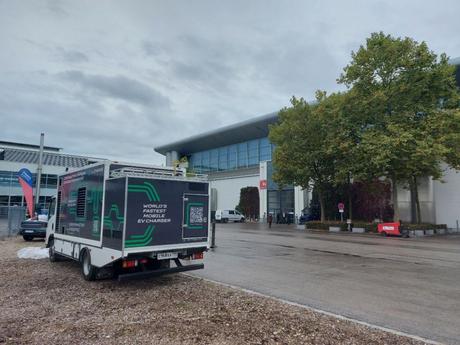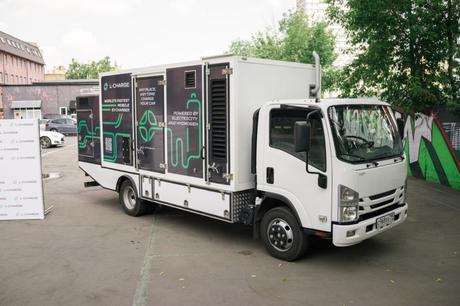Russian project L-Charge starts to roll out its gas powered charging infrastructure for EVs in Europe. Russian share in European gas imports is expected to grow by 10% in upcoming years. L-Charge offers to develop a virtual grid of mobile and stationary mini power plants using natural gas to generate power for EVs. That could ease the pressure on the energy grid while securing the development of the EV market. Here one can find a guest post European EV market could gain from a Russian gas supply by Ludmila Gorodnicheva, PR manager L-Charge:
European EV market could gain from a Russian gas supply
While gas prices are skyrocketing, analysts say this should soon normalize. At the same time a gas supply could boost the charging infrastructure development as another Russian company promises to roll out a gas powered charging infrastructure for EVs in Europe.
Russian share in European gas imports is expected to grow by 10% in upcoming years. LNG supplies are also expected to pick up by 2025 to around 90 Bcm, and peaking in 2030 at some 130 Bcm – SPGlobal says .
As of 2020 Russia occupies over 43% in natural gas imports into the European Union. But apart from the Nord Stream 2 project it could also start exporting value added gas-powered electricity for ever-growing European electric vehicles market as another Russian project L-Charge starts to roll out its network in Europe.

Natural gas demand in the EU is forecasted to grow by 14% to 23% until 2030, with most of the growth expected to come from power plants and the transport industry – Oxford Institute for Energy says. .
Wind and solar can provide up to 60% of power in countries like Germany and Britain, but long periods of quiet and cloudy weather puts pressure on the back-up capacity. So the natural gas is just gaining weight as the main source for power generation. And the abnormal price growth for natural gas illustrates the trend.
European gas market prices have skyrocketed more than 116% since the start of the year, with the ICIS TTF benchmark closing at an all-time high of 47.86 euros ($56.17) per megawatt-hour on Aug. 16. It is reflective of a tight market, with Europe facing incredibly low natural gas storage levels. The continent has to boost its own buffer stockpiles ahead of the heating season, with countries from the U.K. to Spain and Germany already contending with energy inflation due to soaring gas and electricity prices. This creates a pressure on European energy grid and the consumer’s prices for electricity. Carbon free strategy and the electric car revolution in Europe could be jeopardized if electric power generation fails to keep up with demand, while the charging network itself needs to sharpen up its act. However, analyst says that the prices will normalize as storage facilities for gas will be extended. Current situation speaks more of an importance of this source for power generation in following decades. Another problem emerging is that dramatically underdeveloped energy grid infrastructure.
Chris Burghardt, managing director of ChargePoint Europe says building and linked-to-grids charging infrastructure for EVs might require something between 60 and €100 billion investments a year in the coming 10 years in Europe alone. Which seems to be quite a heavy duty considering the postpandemic uncertainty in global economy. However, there could be a solution in developing off-the-grid infrastructure powered by natural gas.
Another Russian company L-Charge offers to develop a virtual grid of mobile and stationary mini power plants using natural gas to generate power for EVs. That could ease the pressure on the energy grid while securing the development of the EV market.”An essential problem still separates us from the massive transition to EV – the underdeveloped charging infrastructure. It is possible to solve this problem quickly by deploying an off-grid network of charging stations”, – says Dmitry Lashin, CEO of L-Charge.
Power generation requires massive spending by governments in Europe while improving public access to charging means companies must end the current bewildering fragmentation, and make taking on board electricity as user-friendly as provided by the traditional fossil fuel network.
“Though there might be enough electricity available, what really matters is the power requirement. If all the EVs decide to charge at the same time, there will be a huge demand on power rather than total energy needed. It will require big investments in additional power generation which has to be CO2 free”, – Gautam Kalghatgi, engineering expert and visiting professor at Oxford University explains.
L-Charge promises to solve both problems as it has presented its mobile EV charger at Smarter Europe in Munich on 6th of October. Designed for highways, gas stations, and parking lots, L-Charge’s stationary charger does not require any staff or connection to an external power grid. Chargers run on an internal supply of liquefied natural gas (LNG) or LNG/H2 mixture. 600 kW power generators are the core of the L-Charge stationary mini-power station for fast charging of EV.
The L-Charge team notes their devices emit 7.05kg of CO2 per 100km of charge power, 68% less than diesel vehicles.
L-Charge plans to roll out its EV charging stations in Europe by 2022. But the first charger will be available in Munich, Barcelona and Amsterdam starting this autumn. The service has already been in operation in Moscow and will come into full operation in Abu Dhabi by the end of 2021.
According to the German OEKO the electric vehicle demand share of total electricity demand will varying between 3% and 25% among the EU-28 countries by 2050. It will increase to more than 10% in many countries. On EU average, it will make up 9.5% by 2050 with an electric car stock penetration of 80%. With the rolling out of the gas powered charging infrastructure for EVs that will mean a greater presence of Russia in European energy market. But this is also how it could benefit from it.


